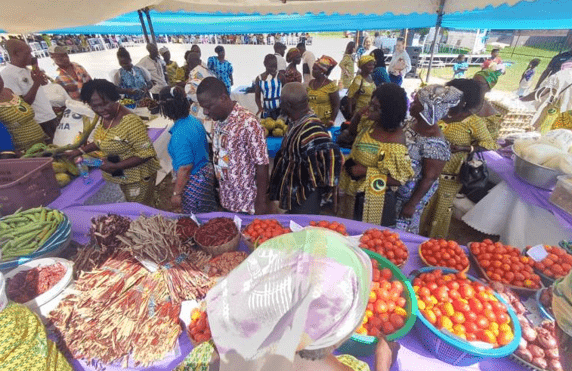By Deborah Asantewaah SARFO
The President of the Development Action Association (DAA), Grace Quaye, has called on the government to deal with the long-standing gender disparities in the agriculture and fisheries industries.
Addressing stakeholders, international partners and members of DAA at the 2024 International Day of Rural Women (IDRW), she noted that addressing the gender inequalities will further promote gender equality and create an inclusive environment for them to thrive.
“On this special day, let us commit to addressing the gender inequalities that persist in the agriculture and fisheries sector by promoting gender equality. We can create a more equitable and inclusive environment where all women have the opportunity to thrive,” she urged.
She encouraged them to advocate for policies and programmes to support rural women’s access to land, credit, training and market. This approach, she believes, will unlock their full potential and contribute to the overall development of their communities.
This year’s edition of IDWA was held under the theme ‘Rural women cultivating good food for all’. DAA, with support from the ‘Sustainable Employment through Agribusiness (AgriBiz) in Ghana’ programme (commissioned by the German Federal Ministry for Economic Cooperation and Development (BMZ) at Kasoa Nyanyano.
The IDRW is celebrated annually to recognise the essential contributions of rural women in agriculture, food security and rural development, highlighting the vital role women play in food production – from farming to processing and distribution, while addressing their unique challenges.
In her keynote address, the Chief of Party for Ghana Fisheries Recovery Activity (GFRA), Heather D’Agnes, highlighted the unique contributions of rural women in both sectors.
She noted that while 50 percent of women globally are associated with farming, the country boasts about 80 percent of women.
“Globally, women account for 50 percent of the farming but in a country like Ghana, it’s more like 80 percent and they play a crucial role in growing, cultivating and selling the food,” she said.
Turning her attention to their roles in the fisheries industry, Ms. D’Agnes said fish represents 70 percent of the protein consumed in Ghana; and women single-handedly process and sell most of them in the country.
“Rural women are the foundation of the nation’s success,” she concluded, taking into account their impacts specifically on the economic, agricultural and fisheries sectors in addition to their respective homes and communities,
In Ghana, IDRW is especially significant as rural women form the backbone of the country’s agricultural sector, contributing to food security and economic growth.
The Deputy Head of Programmes, Sustainability Development through AgriBiz, Bashiru Fuseini, commended the leadership of DAA for championing women’s participation in agriculture and fishers.
He urged partners to continue supporting rural women to produce safe and healthy food for all. He also assured DAA of their commitment to improving conditions that create sustainability and growth in the agriculture sector, particularly for women.
Some challenges highlighted by the women and youth include access to finance or loans, lack of storage facilities, limited access to resources and water pollution caused by illegal mining activities (galamsey), among others.










